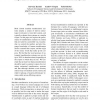Free Online Productivity Tools
i2Speak
i2Symbol
i2OCR
iTex2Img
iWeb2Print
iWeb2Shot
i2Type
iPdf2Split
iPdf2Merge
i2Bopomofo
i2Arabic
i2Style
i2Image
i2PDF
iLatex2Rtf
Sci2ools
ACL
2007
2007
Corpus Effects on the Evaluation of Automated Transliteration Systems
Most current machine transliteration systems employ a corpus of known sourcetarget word pairs to train their system, and typically evaluate their systems on a similar corpus. In this paper we explore the performance of transliteration systems on corpora that are varied in a controlled way. In particular, we control the number, and prior language knowledge of human transliterators used to construct the corpora, and the origin of the source words that make up the corpora. We find that the word accuracy of automated transliteration systems can vary by up to 30% (in absolute terms) depending on the corpus on which they are run. We conclude that at least four human transliterators should be used to construct corpora for evaluating automated transliteration systems; and that although absolute word accuracy metrics may not translate across corpora, the relative rankings of system performance remains stable across differing corpora.
ACL 2007 | Computational Linguistics | Human Transliterators | Machine Transliteration Systems | Transliteration Systems |
| Added | 29 Oct 2010 |
| Updated | 29 Oct 2010 |
| Type | Conference |
| Year | 2007 |
| Where | ACL |
| Authors | Sarvnaz Karimi, Andrew Turpin, Falk Scholer |
Comments (0)

